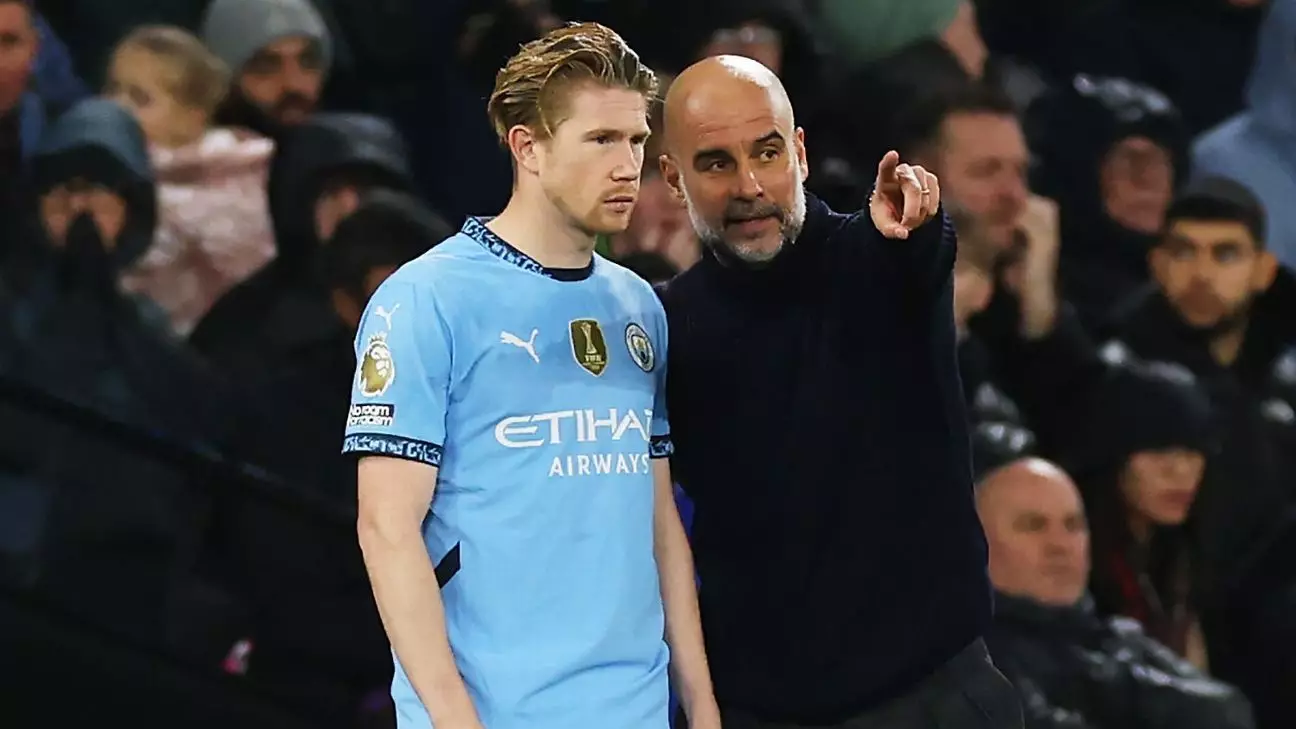When one observes the current landscape of Manchester City football, it’s impossible to ignore the ongoing dialogue surrounding one of the club’s most pivotal players: Kevin De Bruyne. The midfielder, renowned for his extraordinary talent and ability to dictate the game’s tempo, has found himself in a perplexing situation since recovering from an abdominal injury that sidelined him for a significant portion of the season. With whispers of discontent brewing between him and manager Pep Guardiola, it’s essential to dissect the nuances of this relationship and the broader implications for the team’s season.
De Bruyne’s return to action has been anything but smooth. After suffering a significant injury during the UEFA Champions League final against Inter Milan in September, his return was highly anticipated—not simply for his individual brilliance but for what he contributes to the collective unit. However, since his comeback, De Bruyne has only made appearances as a substitute, sparking rampant speculation about potential rifts in the locker room.
Notably, Guardiola’s decision to introduce De Bruyne against Liverpool—only when the team was already two goals down—raised eyebrows. This tactical choice naturally spurred pundits like Gary Neville and Jamie Carragher to suggest that underlying issues might be at play, asserting that the situation was “unusual” and signaling discord. Yet it’s crucial to note that speculation in sports media often veers into sensationalism, especially without concrete evidence.
In a recent news conference, Guardiola addressed these emerging narratives head-on, dismissing claims of a personal vendetta against De Bruyne. The manager’s impassioned response illustrated his respect for the player’s past contributions to the club: “He’s delivered to me the biggest success to this club,” he remarked. Guardiola emphasized that the coach-player relationship is not simply transactional; it is built upon mutual respect and a shared goal of achieving team success.
Guardiola’s insistence on De Bruyne’s need for a gradual reintegration into the team is essential to understanding the strategic mindset that drives decision-making in football. At 33, and having endured injuries that can take a toll on any athlete’s longevity, De Bruyne’s transition back to peak performance requires patience and careful management. Guardiola’s approach seems to center around not merely rushing De Bruyne back into the starting eleven but ensuring that when he does return fully, it aligns with the team’s overall rhythm and dynamics.
One of the most enduring themes of Guardiola’s coaching philosophy is the idea that football is a collective sport where all players must contribute to both attacking and defending. He has been clear about the limitations of relying on individual talent alone, pointing out that even stars like De Bruyne and Erling Haaland cannot single-handedly resolve the issues that the team currently faces. The notion that a single player is the panacea to a larger problem neglects the complexities of teamwork, where synergy and organization matter immensely.
Guardiola’s comments regarding the challenges of reintegrating a player of De Bruyne’s caliber also stem from the understanding that with great talent comes high expectations. The pressure to perform can be overwhelming, and thus, a measured plan for re-establishing a player’s role within the squad is crucial. The reality is that football clubs must adapt to the present circumstances in which they find themselves, and maintaining team morale, cohesion, and collective confidence is pivotal to that adaptation.
Looking Ahead: Hope Amidst Challenges
As Manchester City prepares for its next match against Nottingham Forest, the urgency to turn the tide becomes even more pronounced. The prospect of reintegrating De Bruyne into the starting lineup offers a glimmer of hope. Guardiola’s acknowledgment of De Bruyne’s “glimpses of brilliance” indicates a recognition that, while he may not be at his prime, the midfielder still possesses an invaluable knack for influencing games.
In closing, while provoking discussions about a rift between Guardiola and De Bruyne are enticing narratives for media outlets, it is more beneficial to consider the broader picture of player fitness, team dynamics, and the strategies that define managerial decisions. As the season unfolds, all eyes will be on how this unfolding saga impacts not just De Bruyne’s career but Manchester City’s ambitions in a fiercely competitive Premier League landscape.

